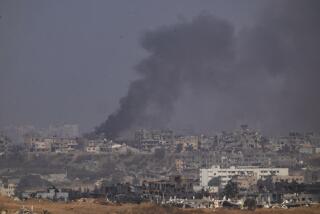Russia’s Bar on Death Penalty Questioned
- Share via
MOSCOW — Prospects of a guilty verdict in the trial of the only surviving suspect in the 2004 Beslan school hostage crisis have now turned the debate here to Russia’s 10-year-old moratorium on the death penalty.
A judge in southern Russia has been asked by prosecutors and victims’ relatives to ignore the policy and impose a death sentence in the attack, the worst case of terrorism in the nation’s history.
Such a decision would pose political difficulties for Russia, which is scheduled Friday to take over the chairmanship of the Council of Europe’s steering committee. The 46-member organization has urged Moscow to adopt the group’s protocol against capital punishment.
The court also must weigh demands from some of the victims’ families, who insist that the suspect, Nur-Pashi Kulayev, may still have information about who organized the attack and what touched off the shootout in which 371 people died, including 31 attackers.
“We don’t have all the information about this Beslan tragedy, and we have reason to hope that if Kulayev remains alive, that he will reveal more information,” said Ella Kesayeva, head of the Voice of Beslan, whose brother-in-law and two nephews were among the victims. The attack in Beslan, a city in North Ossetia, was the worst in a wave of violence in Russia’s North Caucasus region, where growing Muslim and separatist militancy has spread from Chechnya.
On Wednesday, in neighboring Ingushetia, the deputy interior minister was killed along with seven people when a bomb exploded near his motorcade. And in Dagestan, officials said Wednesday that two militants killed a day earlier in a shootout with police had a hand-drawn map of a local school. Six explosive devices were found in the yard of the school, in the town of Kizil-Yurt, authorities said.
Susanna Dudiyeva, head of a group of Beslan mothers who have supported the push for the death penalty, said terrorist attacks against schoolchildren warrant the ultimate punishment.
“I’m by no means bloodthirsty, but I believe it’s pointless to try to reeducate or reform terrorists. They simply need to be annihilated,” she said in a telephone interview.
The Soviet Union executed an average of 730 people a year from the 1960s to its dissolution in 1991. In 1996, Russia imposed a moratorium on the death penalty, and three years later, the Constitutional Court formally barred death sentences. Lower courts since then have ordered the death penalty in a few cases, but it has not been carried out.
Russia has not adopted the Council of Europe’s protocol abolishing the death penalty, despite increasing calls from Europe to formalize the ban.
To the contrary, several legislators this year have talked of reinstating capital punishment, in part citing overwhelming support in opinion polls and a wave of terrorist bombings and hostage-takings that have left hundreds dead across Russia.
No case is more incendiary than Beslan, where a group of mainly Chechen and Ingush militants held more than 1,000 children, teachers and parents in a gymnasium for three days, before a massive series of explosions and gunfire erupted that left hundreds dead.
The prosecutor-general’s office has officially requested the death penalty, arguing that it is the only appropriate punishment. A judge for the last several days has been reading his lengthy finding in court, and observers believe it will end with a guilty verdict. Sentencing will follow immediately thereafter, perhaps by the end of the week.
“This was not your ordinary killing. It was a cynical terrorist attack with numerous victims, and on this basis, the prosecutor-general’s office has asked for capital punishment,” spokesman Sergei Prokopov said in a telephone interview. “We are acting on the basis of the rights that we have under the law.”
He said courts have the right to impose the death penalty and that the moratorium expires in January 2007, when the system of jury trials is in place in the last region of Russia that doesn’t have them, Chechnya. “Then, this will be the basis of either prolonging the moratorium, or it is possible that the Constitutional Court will ban the death sentence outright throughout the country,” he said.
Konstantin Kosachev, head of the Russian parliament’s Foreign Affairs Committee, told reporters in April that there was “no stable majority” in the State Duma in favor of ratification of the protocol against the death penalty, and substantial sentiment for reinstating executions.
“We certainly have no right to debate ratification while there is a risk that it will be rejected,” Kosachev said. “If this happens, the issue will inevitably be delayed.”
But many members of the Parliamentary Assembly of the Council of Europe said it was important for Russia to ratify the death penalty protocol as it prepares to take over the six-month chairmanship of the council’s committee of ministers.
“Russia is the last member of the Council of Europe who has not yet ratified. They have the moratorium, that’s fine. And since their membership, they haven’t practiced the death penalty,” Rene van der Linden, the Dutch president of the council, said in a telephone interview.
“But I also have the impression when I have had meetings with members of the [parliament] and the government in Russia that, especially after Beslan, it has become more difficult,” he said. “Because public opinion has taken a strong stand after this ... terrible event.”
More to Read
Sign up for Essential California
The most important California stories and recommendations in your inbox every morning.
You may occasionally receive promotional content from the Los Angeles Times.










